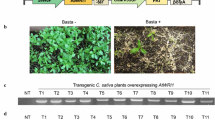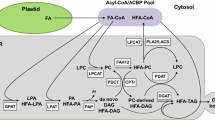Abstract
Key message
Enhanced levels of punicic acid were produced in the seed oil of Arabidopsis over-expressing pomegranate FATTY ACID CONJUGASE driven by heterologous promoters, among which the linin promoter was the most efficient.
Abstract
Fatty acids with conjugated double bonds play a special role in determining both the nutritional and industrial uses of plant oils. Punicic acid (18:3Δ9cis,11trans,13cis), a conjugated fatty acid naturally enriched in the pomegranate (Punica granatum) seeds, has gained increasing attention from the biotechnology community toward its production in metabolically engineered oilseed crops because of its significant health benefits. The present study focused on selecting the best heterologous promoter to drive the expression of the P. granatum FATTY ACID CONJUGASE (PgFADX) cDNA as a means of producing punicic acid in Arabidopsis seed oil. Among the four promoters of genes encoding seed storage proteins from different crop species, the linin promoter led to the highest accumulation of punicic acid (13.2% of total fatty acids in the best homozygous line). Analysis of the relative expression level of PgFADX in developing seeds further confirmed that the linin promoter was most efficient in Arabidopsis. In addition, a conserved profile of cis-regulatory elements were identified in four heterologous promoters by bioinformatic analysis, and their possible roles in regulating gene expression during plant development were also discussed based on the results of this study in combination with the literature. This study contributes to metabolic engineering strategies aimed at enhancing the production of bioactive fatty acids in oilseed crops.





Similar content being viewed by others
Abbreviations
- ANOVA:
-
One-way analysis of variance
- CLNA:
-
Conjugated linolenic acid
- EV:
-
Empty vector
- FA:
-
Fatty acid
- FAD:
-
Fatty acid desaturase
- FAE:
-
Fatty acid elongase
- FAMEs:
-
Fatty acid methyl esters
- HSD:
-
Honestly significant difference
- ORF:
-
Open reading frame
- PgFADX:
-
Punica granatum fatty acid conjugase
References
Aruna P, Venkataramanamma D, Singh AK, Singh RP (2016) Health benefits of punicic acid: a review. Compr Rev Food Sci Food Saf 15:16–27
Banihani S, Swedan S, Alguraan Z (2013) Pomegranate and type 2 diabetes. Nutr Res 33:341–348
Boothe J, Nykiforuk C, Shen Y, Zaplachinski S, Szarka S, Kuhlman P, Murray E, Morck D, Moloney MM (2010) Seed-based expression systems for plant molecular farming. Plant Biotechnol J 8:588–606
Bustos MM, Guiltinan MJ, Jordano J, Begum D, Kalkan FA, Hall TC (1989) Regulation of beta-glucuronidase expression in transgenic tobacco plants by an A/T-rich, cis-acting sequence found upstream of a French bean beta-phaseolin gene. Plant Cell 1:839–853
Cahoon EB, Carlson TJ, Ripp KG, Schweiger BJ, Cook GA, Hall SE, Kinney AJ (1999) Biosynthetic origin of conjugated double bonds: production of fatty acid components of high-value drying oils in transgenic soybean embryos. Proc Natl Acad Sci USA 96:12935–12940
Cahoon EB, Dietrich CR, Meyer K, Damude HG, Dyer JM, Kinney AJ (2006) Conjugated fatty acids accumulate to high levels in phospholipids of metabolically engineered soybean and Arabidopsis seeds. Phytochemistry 67:1166–1176
Chandrasekharan MB, Bishop KJ, Hall TC (2003) Module-specific regulation of the beta-phaseolin promoter during embryogenesis. Plant J 33:853–866
Chaudhary S, van Rooijen G, Moloney MM, Singh S (2010) Flax seed specific promoters. Patent US 7642346 B2
Chen G, Woodfield HK, Pan X, Harwood JL, Weselake RJ (2015) Acyl-trafficking during plant oil accumulation. Lipids 50:1057–1068
Clough SJ, Bent AF (1998) Floral dip: a simplified method for Agrobacterium-mediated transformation of Arabidopsis thaliana. Plant J 16:735–743
Edwards K, Johnstone C, Thompson C (1991) A simple and rapid method for the preparation of plant genomic DNA for PCR analysis. Nucleic Acids Res 19:1349
Ellerstrom M, Stalberg K, Ezcurra I, Rask L (1996) Functional dissection of a napin gene promoter: identification of promoter elements required for embryo and endosperm-specific transcription. Plant Mol Biol 32:1019–1027
Ezcurra I, Ellerström M, Wycliffe P, Stålberg K, Rask L (1999) Interaction between composite elements in the napA promoter: both the B-box ABA-responsive complex and the RY/G complex are necessary for seed-specific expression. Plant Mol Biol 40:699–709
Gasmi J, Sanderson JT (2010) Growth inhibitory, antiandrogenic, and pro-apoptotic effects of punicic acid in LNCaP human prostate cancer cells. J Agric Food Chem 58:12149–12156
Goderis IJ, De Bolle MF, Francois IE, Wouters PF, Broekaert WF, Cammue BP (2002) A set of modular plant transformation vectors allowing flexible insertion of up to six expression units. Plant Mol Biol 50:17–27
Grossmann ME, Mizuno NK, Schuster T, Cleary MP (2010) Punicic acid is an omega-5 fatty acid capable of inhibiting breast cancer proliferation. Int J Oncol 36:421–426
Hernandez-Garcia CM, Finer JJ (2014) Identification and validation of promoters and cis-acting regulatory elements. Plant Sci 217–218:109–119
Hontecillas R, O’Shea M, Einerhand A, Diguardo M, Bassaganya-Riera J (2009) Activation of PPAR gamma and alpha by punicic acid ameliorates glucose tolerance and suppresses obesity-related inflammation. J Am Coll Nutr 28:184–195
Iwabuchi M, Kohno-Murase J, Imamura J (2003) Delta 12-oleate desaturase-related enzymes associated with formation of conjugated trans-delta 11, cis-delta 13 double bonds. J Biol Chem 278:4603–4610
Jaworski J, Cahoon EB (2003) Industrial oils from transgenic plants. Curr Opin Plant Biol 6:178–184
Johanningsmeier SD, Harris GK (2011) Pomegranate as a functional food and nutraceutical source. Annu Rev Food Sci Technol 2:181–201
Kohno H, Suzuki R, Yasui Y, Hosokawa M, Miyashita K, Tanaka T (2004) Pomegranate seed oil rich in conjugated linolenic acid suppresses chemically induced colon carcinogenesis in rats. Cancer Sci 95:481–486
Koncz C, Schell J (1986) The promoter of TL-DNA gene 5 controls the tissue-specific expression of chimaeric genes carried by a novel type of Agrobacterium binary vector. Mol Gen Genet 204:383–396
Lescot M, Dehais P, Thijs G, Marchal K, Moreau Y, Van de Peer Y, Rouze P, Rombauts S (2002) PlantCARE, a database of plant cis-acting regulatory elements and a portal to tools for in silico analysis of promoter sequences. Nucleic Acids Res 30:325–327
Livak KJ, Schmittgen TD (2001) Analysis of relative gene expression data using real-time quantitative PCR and the 2(−Delta Delta C(T)) method. Methods 25:402–408
Mietkiewska E, Lin Y, Weselake RJ (2014a) Engineering production of C18 conjugated fatty acids in developing seeds of oil crops. Biocatal Agric Biotechnol 3:44–48
Mietkiewska E, Miles R, Wickramarathna A, Sahibollah AF, Greer MS, Chen G, Weselake RJ (2014b) Combined transgenic expression of Punica granatum conjugase (FADX) and FAD2 desaturase in high linoleic acid Arabidopsis thaliana mutant leads to increased accumulation of punicic acid. Planta 240:575–583
Murashige T, Skoog F (1962) A revised medium for rapid growth and bio assays with tobacco tissue cultures. Physiol Plant 15:473–497
Napier JA, Haslam RP, Beaudoin F, Cahoon EB (2014) Understanding and manipulating plant lipid composition: metabolic engineering leads the way. Curr Opin Plant Biol 19:68–75
Qiu X, Truksa M, Hu Z (2008) Flax (Linum usitatissimum L.) seed-specific promoters. Patent EP 1925671 A1
Rogalski M, Carrer H (2011) Engineering plastid fatty acid biosynthesis to improve food quality and biofuel production in higher plants. Plant Biotechnol J 9:554–564
Rossak M, Smith M, Kunst L (2001) Expression of the FAE1 gene and FAE1 promoter activity in developing seeds of Arabidopsis thaliana. Plant Mol Biol 46:717–725
Smith MA, Moon H, Chowrira G, Kunst L (2003) Heterologous expression of a fatty acid hydroxylase gene in developing seeds of Arabidopsis thaliana. Planta 217:507–516
Spilmont M, Leotoing L, Davicco MJ, Lebecque P, Mercier S, Miot-Noirault E, Pilet P, Rios L, Wittrant Y, Coxam V (2013) Pomegranate seed oil prevents bone loss in a mice model of osteoporosis, through osteoblastic stimulation, osteoclastic inhibition and decreased inflammatory status. J Nutr Biochem 24:1840–1848
Truksa M, MacKenzie Samuel L, Qiu X (2003) Molecular analysis of flax 2S storage protein conlinin and seed specific activity of its promoter. Plant Physiol Biochem 41:141–147
Vroegrijk IO, van Diepen JA, van den Berg S, Westbroek I, Keizer H, Gambelli L, Hontecillas R, Bassaganya-Riera J, Zondag GC, Romijn JA, Havekes LM, Voshol PJ (2011) Pomegranate seed oil, a rich source of punicic acid, prevents diet-induced obesity and insulin resistance in mice. Food Chem Toxicol 49:1426–1430
Wang L, Martins-Green M (2014) Pomegranate and its components as alternative treatment for prostate cancer. Int J Mol Sci 15:14949–14966
Wang L, Li W, Lin M, Garcia M, Mulholland D, Lilly M, Martins-Green M (2014) Luteolin, ellagic acid and punicic acid are natural products that inhibit prostate cancer metastasis. Carcinogenesis 35:2321–2330
Yuan GF, Chen XE, Li D (2014) Conjugated linolenic acids and their bioactivities: a review. Food Funct 5:1360–1368
Acknowledgements
We thank Dr. Xiao Qiu (University of Saskatchewan, Saskatoon, Canada) for kindly providing the plasmid carrying the conlinin promoter used as a PCR template. Financial support provided by Alberta Innovates Bio Solutions and the Natural Sciences and Engineering Research Council (NSERC) of Canada is gratefully acknowledged.
Author information
Authors and Affiliations
Corresponding author
Additional information
Communicated by M. C. Jordan.
Electronic supplementary material
Below is the link to the electronic supplementary material.
Rights and permissions
About this article
Cite this article
Song, Z., Mietkiewska, E. & Weselake, R.J. The linin promoter is highly effective in enhancing punicic acid production in Arabidopsis. Plant Cell Rep 36, 447–457 (2017). https://doi.org/10.1007/s00299-016-2094-8
Received:
Accepted:
Published:
Issue Date:
DOI: https://doi.org/10.1007/s00299-016-2094-8




